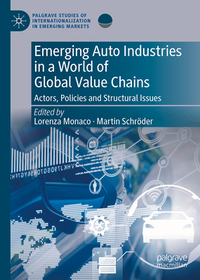
Emerging Auto Industries in a World of Global Value Chains
Actors, Policies and Structural Issues
Series: Palgrave Studies of Internationalization in Emerging Markets;
- Publisher's listprice EUR 192.59
-
79 876 Ft (76 073 Ft + 5% VAT)
The price is estimated because at the time of ordering we do not know what conversion rates will apply to HUF / product currency when the book arrives. In case HUF is weaker, the price increases slightly, in case HUF is stronger, the price goes lower slightly.
- Discount 12% (cc. 9 585 Ft off)
- Discounted price 70 291 Ft (66 944 Ft + 5% VAT)
Subcribe now and take benefit of a favourable price.
Subscribe
79 876 Ft

Availability
Not yet published.
Why don't you give exact delivery time?
Delivery time is estimated on our previous experiences. We give estimations only, because we order from outside Hungary, and the delivery time mainly depends on how quickly the publisher supplies the book. Faster or slower deliveries both happen, but we do our best to supply as quickly as possible.
Product details:
- Edition number 2025
- Publisher Springer Nature Switzerland
- Date of Publication 16 December 2025
- Number of Volumes 1 pieces, Book
- ISBN 9783031764097
- Binding Hardback
- No. of pages335 pages
- Size 210x148 mm
- Language English
- Illustrations XXVII, 335 p. 22 illus., 16 illus. in color. Illustrations, black & white 700
Categories
Long description:
"
This book provides a global picture of automotive industry development in emerging countries through the lens of global value chain analysis. Over the past two decades, auto production increasingly shifted to emerging economies, marking a significant reconfiguration of the global auto industry. This volume traces such shift to illustrate industrial development dynamics, focusing on new global players, their industrial strategies and on the structural characteristics of these emerging markets. It features chapters devoted to the theoretical analysis of industrial development in emerging countries, and collects a wide range of country cases illustrating different trajectories of auto industrialisation. These include better-known cases of dominant players as well as still underexplored cases such as Argentina, Hungary, Poland, Morocco, South Africa, Thailand and Vietnam. This book will provide valuable reading to those researching globalization and emerging countries, their comparative industrialisation, and the intersection of government policies and business strategy, specifically concerning the automotive industry.
" More
Table of Contents:
1: Introduction.-
PART 1: Theoretical Perspectives on Development of the Global Automotive Value Chain
2: Industrial Development in the Age of Global Value Chains: Implications for Emerging Automotive Industries.-
3: The Development of the Automotive Industry in Less Developed Countries.-
4: The Conditions for Upgrading: the Role of Multinational Automobile Carmakers in the Governance of Global Value Chains.-
5: How Labour Regimes Explain Development in Global Value Chains.-
6: Technology Adoption within Global Value Chains: Upgrading was (and remains) a Demanding Stairway.-
7: Institutional Origins of Successful Auto Industrialization: The East Asian Cases.-
8: Automotive Development Strategies in the Age of Global Value Chains: National Champion, Product Champion, and Technology Champion.-
PART 2: Country Cases: Development Trajectories of Automotive Industries in Emerging Countries.-
9: The Changing Position of Poland’s Automotive Industry in the European Division of Labour.-
10: Supply Chain Linkages in the Hungarian Automotive Industry: Challenges for Industrial Upgrading.-
11: Brazilian Automotive Industry: Ups, Downs and Future Challenges.-
12: The Emergence of the Light Commercial Vehicles Production Hub in Argentina.-
13: The Role of the State in the Emergence and Development of the Electric Vehicles Industry in China: Achievements, Opportunities and Challenges Ahead.-
14: Auto and EVs: the Case of India.-
15: Thailand: does Industrial Policy still Matter in an Era of Transition towards the Electrification of the Automotive Industry? .-
16: Vietnam’s Automotive Industry: Expansion with Limited Development.-
17: Production Volumes, Localisation and Technological Upgrading: South Africa in the Global Automotive Value Chain.-
18: Morocco’s Systematic Approach to Developing an Export-oriented Automotive Sector.-
Part 3: Conclusions.-
19: The Present and Future of Emerging Automotive Industries: Value Chain Reconfigurations as Drivers and Outcomes of Change.
CONCLUSIONS.
More



